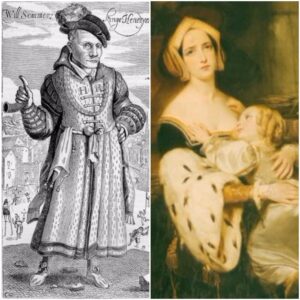 With his letter written on the Feast of St James (25th July) 1535, to Nicolas Perrenot de Granvelle, who was Charles V’s advisor, Eustace Chapuys included an interesting post script. It was written in cipher, but said:
With his letter written on the Feast of St James (25th July) 1535, to Nicolas Perrenot de Granvelle, who was Charles V’s advisor, Eustace Chapuys included an interesting post script. It was written in cipher, but said:
“P.S.—He the other day nearly murdered his own fool, a simple and innocent man, because he happened to speak well in his presence of the Queen and Princess, and called the concubine “ribaude” and her daughter “bastard.” He has now been banished from Court, and has gone to the Grand Esquire, who has sheltered and hidden him.”
Here, Chapuys, who was the imperial ambassador at the court of Henry VIII, is saying that the king’s fool, Will Somer (Summer), was nearly killed by the king for calling Queen Anne Boleyn “ribald” and saying that Princess Elizabeth was a bastard. Somer kept his head but Chapuys states that he was banished from the court and that he was sheltered by Sir Nicholas Carew, chief esquire of the king. The king was obviously furious.
Somer did manage to get back into the king’s good graces and went on to serve Edward VI and Mary I as court fool. Perhaps Elizabeth I didn’t know that he’d once called her a bastard, or perhaps she forgave him, because he attended her at her coronation in January 1559. Somer died on 15th June 1560.
Also on this day in history, 25th July 1554, Queen Mary I married Philip of Spain, son of Charles V, at Winchester Cathedral. Click here to read more.
Notes and Sources
- ‘Spain: July 1535, 1-31’, in Calendar of State Papers, Spain, Volume 5 Part 1, 1534-1535, ed. Pascual de Gayangos (London, 1886), pp. 507-523. British History Online http://www.british-history.ac.uk/cal-state-papers/spain/vol5/no1/pp507-523, 184.